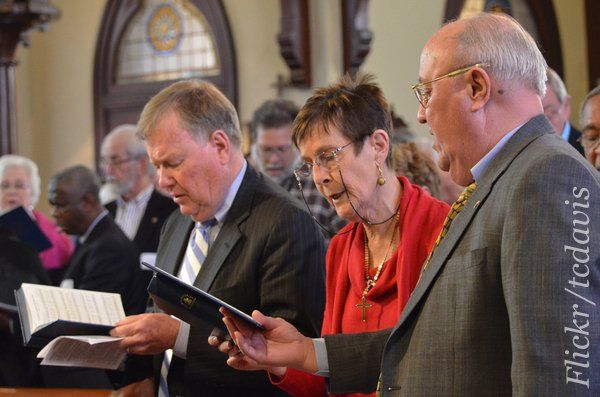Last month we looked at the biblical principles and theology that ought to govern our use of music in worship. Now we consider some of the practical guidelines we should follow in selecting good Christian music.
Lyrics and Bible truth
The foremost consideration in choosing a song is the content and message of its words. Does the lyric convey a scriptural message, or are its words repetitive and devoid of theological content?
Are there scriptural or moral flaws? Are the sentiments expressed anti-biblical, or even anti-Trinitarian? We must be careful not to sing unscriptural songs and nonsensical ditties.
For example, consider these words:
When my Lord shall come again,
When he walks and talks with men …
Will he feel a welcome here or will he go away in tears?
Am I all that I should be
Is he satisfied with me?
The theology of this verse is absolutely unbiblical. At his Second Coming, Christ will appear as King and Judge. He will certainly not ‘go away in tears’ but will accomplish all that he has purposed.
Or, again, what about this song for children?
Father Abraham has seven children,
Seven children have father Abraham,
One of them is fat, one of them is thin …
This is both ridiculous and factually wrong. Abraham had at least eight children and we know nothing about their size.
Calvin Johannson says: ‘We need to practise a theism which is comprehensively disciplined (and accurate). If we do not, our words and symbols will say one thing but our deeds, actions and forms (including music) will say another’ (Discipling Music Ministry, Hendrickson 1992, p.17).

Words and music
A chief principle of choral composition is that the musical arrangement must harmonise with the words that go with it. Consider the melody and rhythm. Are they compatible with the words?
Are they uplifting, devotional and edifying? Or are they jarring or distracting? Music has a character of its own and to some extent conveys its own message.
If an inappropriate tune is coupled with fine lyrics, the incongruity can be disastrous or ludicrous. The way a text is expressed is as important as the text itself.
Sacred music must be characterised by clear communication and comprehension of the text. We must sing with understanding and meaning.
Paul testifies: ‘if I pray in an unknown tongue, my spirit prayeth, but my understanding is unfruitful … I will sing with the spirit, and I will sing with the understanding also’ (1 Corinthians 14:14-15).
Can you sing ‘Near the Cross’ in a flippant, fast-paced and frivolous way? Or ‘Lead me to Calvary’ in a swaying, jazzing and hypnotic manner?
In the 1970s a worldly pop group called ‘Boney M’ sang words taken from Psalm 137: ‘By the river of Babylon, there we sat down, yea, when we remembered Zion’.
Even though the words were from Scripture, their rendition was totally unacceptable because the jazzy, seductive music was incompatible with their sombre meaning.
Reverent worship
E. J. Young, a reformed theologian, wrote: ‘It is well-known that the character of the song, almost equally with the character of the preaching, controls the theology of the church.
‘In more than one communion where the preaching had departed from the biblical truth, the remnant of sound theology contained in favourite hymns has prevented the spiritual life of the church from becoming fully blighted.
‘There is a need for the resurgence of reverent worship of the Lord in song. It is essential that he be worshipped in accordance with his own infallible Word and that worship seeks to reflect the whole counsel of his will’ (Trinity Hymnal Preface, Great Communion Productions, 1976).
Style and rhythm

The text used to convey spiritual truth should be carefully composed. Some so-called Christian songs are shallow, superficial and irreverent, like this one: ‘Give me gas in my car, keep me trucking for the Lord’.
Music affects our feelings and behaviour. Some Christian music grips young hearts by its sensuality.
They reject traditional church music as outmoded and boring and, as a consequence, a worldly culture has invaded the church.
Rhythms, too, must correspond to the spiritual emphasis of the words. Rhythms that are syncopated, lilting or toe-tapping, have no place in the worship of God.
Sensual, suggestive and worldly music must not be mixed with sacred words and tunes. Much of the contemporary Christian music sung in some charismatic and liberal churches is outrageously unacceptable. It devastates Christian influence and testimony.
Doctrinal and appropriate
The choice of church music and hymns should reflect the relevance and needs of the occasion. There is an appropriate hymn for every occasion.
For example, to begin the worship service, a hymn of praise like ‘O for a thousand tongues’ or ‘O worship the King’ might be chosen.
For an offertory hymn we might select ‘All to Jesus I surrender’ or ‘More love to thee’. For some occasions a hymn of consolation and comfort might be needed, such as ‘The Comforter has come’ or ‘Keep on believing’.
During a vigil service, we might sing ‘Abide with me’; on Resurrection Sunday, ‘Low in the grave he lay’; and so on.
Appropriateness and relevance are important if the hymn or music is to reinforce the message or the occasion.
Ministry, not entertainment
The purpose of sacred music is to glorify God and edify the saints. The church must promote good healthy Christian music.
Johannson comments: ‘Music in church is a change agent – poor church music denies the gospel. Right music will exert a positive influence on people – worldly unedifying music will distort and corrupt the minds of men. We are affected by what we hear’.
We should teach Christian virtues and doctrine through good Christian music. Sacred music is a ministry to the soul, not an entertainment or gratification of the flesh.
Many can testify to the godly influence of healthy music in their spiritual lives. It was said that more were converted by Charles Wesley’s hymns than by John Wesley’s sermons.
The choice of hymns and music plays a vital role in congregational worship. The theme of sound, acceptable, reverential worship of a sovereign God is dominant throughout the Word of God, from Genesis to Revelation.
Every Sabbath is an emblem of eternal rest. Believers should prepare for eternal worship by singing God-honouring, biblically sound hymns, choruses and spiritual songs, worshipping God in spirit and in truth (Colossians 3:16).
Accord with Scripture
The selection of hymns should be biblically sound. Lyrics on Christology, pneumatology, theology and eschatology must accord with Scripture.
There is an acceptable way of worshipping the living and true God. The Westminster Assembly defined what is commonly called the ‘regulative principle’ in worship: ‘He may not be worshipped according to the imagination and devices of men or any way not prescribed in the Holy Scripture’ (Westminster Confession of Faith, 21:1).
God prescribes how he may be approached and it is not left to the whims and fancies of men. There is to be sanctity of worship, reverence and awe for the holy and Almighty God.
To some degree, different ethnic cultures, or different forms of church government, may influence our choice of music. But the overriding principle should be one of sanctity, sacred devotion, reverence, awe, decency and orderliness in worship, praising the Lord always (1 Corinthians 14:40; John 4:24).
The words in Colossians 3:16-17 should be our guide and principle: ‘Let the word of Christ dwell in you richly in all wisdom; teaching and admonishing one another in psalms and hymns and spiritual songs, singing with grace in your hearts to the Lord’.
Good hymns speak to our heart and can teach and admonish us.
Conclusion
Music as a medium can be used for either good or evil. Paul exhorts: ‘I beseech you therefore, brethren, by the mercies of God, that ye present your bodies a living sacrifice, holy, acceptable unto God, which is your reasonable service.
‘And be not conformed to this world: but be ye transformed by the renewing of your mind, that ye may prove what is that good, and acceptable, and perfect will of God’ (Romans 12:1-2).
We must not be conformed to the world’s carnal tastes but, rather, transformed by godly, spiritual, theologically sound and edifying Christian music.
As justified and sanctified people, we should avoid all forms of music that are unedifying and enslaving. Let them not infiltrate either the church or our Christian homes.
Let us be pure and undefiled, offering acceptable, reverential worship and ministry in a day when many churches are confused and compromised.


















